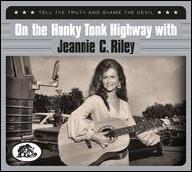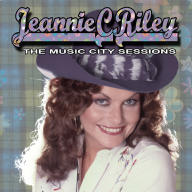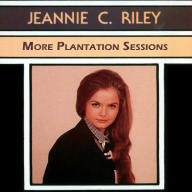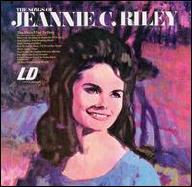Jeannie C. Riley was born Jeanne Carolyn Stephenson on October 19, 1945 in the small Texas town of Stamford. Her father made his living as a mechanic and her mother had a career of her own as a nurse. Growing up in Texas, Riley grew to love music, and dreamed that her talent could be the key to a better way of life. Riley made her public debut as a singer in the early '60s at a performance hosted by her uncle Johnny Moore, a country singer who had scored a few regional hits. Local country fans were impressed with Riley's performance, and she began singing regularly at Moore's monthly jamborees. She had yet to graduate from high school when she married her boyfriend, Mickey Riley, in December 1962, and they welcomed a daughter, Kim Michelle Riley, in January 1966. Meanwhile, Weldon Myrick, a pedal steel guitarist who had played at several of Riley's jamboree shows in Texas, had relocated to Nashville and felt that rising star Connie Smith sounded a great deal like her. Myrick encouraged Riley to come to Nashville and pursue a career as a singer, and in time Riley and Mickey packed their bags and moved to Music City. She worked as a secretary at Passkey Records while cutting demos in her spare time and eventually struck a deal with Little Darlin' Records, a Nashville label co-founded by Johnny Paycheck. In 1967, Little Darlin' issued her debut single, "You Write the Music" b/w "What About Them." Riley would cut an album's worth of material for Little Darlin' but after her first 45 flopped, they declined to release a second single.
Riley's career seemed stuck in neutral until Shelby Singleton, a producer and promotions man who had helped make a fistful of records hits, heard a publishing demo she had recorded for a tune called "The Old Town Drunk." Singleton had recently launched his own country label, Plantation Records, and was eager to cut a tune written by Tom T. Hall about a woman standing up to small-town hypocrites on her daughter's behalf. Singleton believed Riley had the right voice for the song, so he bought out her deal with Little Darlin' and brought her to the studio to cut the song. While initially Riley didn't think much of the song, she gave it a go, and in less than an hour she had cut "Harper Valley P.T.A." Upon the single's release, both country and pop radio enthusiastically embraced it, even though some C&W stations blanched at the song's depiction of small town sinfulness, and rock stations usually passed on songs that made no concession to the crossover market. In August 1968, "Harper Valley P.T.A." hit the top of the pop and country charts; it was the first time a female artist would manage this feat, and it wouldn't happen again until 1980, when Dolly Parton released "9 to 5."
In a matter of weeks, Riley went from obscurity to stardom as "Harper Valley P.T.A." became a cultural phenomenon and Little Darlin' wasted no time releasing their Riley material on a 1968 album called Sock Soul; in 1969 Capitol would repackage the same LP under the title The Songs of Jeannie C. Riley. It was trounced in the marketplace by Riley's first album for Plantation, called Harper Valley U.S.A., which topped the country album chart and rose to number 12 on the pop survey. The song also earned Riley a Grammy award for Best Female Country Vocal Performance. "Harper Valley P.T.A." proved to be Riley's first and last single to cross into the Pop Top 40, but she became a frequent presence on network television in 1969 and 1970, starring in her own TV special (titled, of course, Harper Valley P.T.A.) and appearing on The Ed Sullivan Show, The Johnny Cash Show, The Bob Hope Show, American Bandstand, and The Glen Campbell Goodtime Hour, as well as touring frequently. Riley continued to enjoy success on the country charts, landing ten more singles in the Country Top 40 between December 1968 and October 1971. (Five of them -- "The Girl Most Likely," "There Never Was a Time," Country Girl," "Oh, Singer," and "Good Enough to Be Your Wife" -- made the Top Ten.) Riley also knocked out five more albums for Plantation during the same period, but after a dispute between her and Singleton, who she believed was paying her less than her due, she left the label and signed with MGM Records. Her first single for MGM, "Houston Blues," arrived in November 1971, and in 1972 she enjoyed two more Country Top 40 singles, "Give Myself a Party" and "Good Morning Country Rain." However, after "When Love Has Gone Away" hit number 44 in March 1973, it would mark the last time Riley released a 45 than rose above 50 on the Country Singles charts. Short-lived deals with Mercury and Warner Bros. resulted in singles that made little impression, and while Riley continued to tour, her most successful release of this period was the soundtrack album to a 1978 film adaptation of Harper Valley U.S.A., starring Barbara Eden.
As Riley struggled with an unhappy marriage, a career on the downturn, and financial woes, she experienced a spiritual rebirth and became a born again Christian. In 1979, she released an album of Christian-themed music, Wings to Fly, and in 1981, she brought out From Harper Valley to the Mountain Top, which appeared at the same time as her memoir of the same name. Throughout the '80s, Riley put her primary focus on spiritual music, though she still recorded secular material on the albums Total Woman (1984) and Jeannie C. Riley (1986), the latter of which found her re-recording "Harper Valley P.T.A." The album Here's Jeannie C. arrived in 1991, but a dispute with her manager in the early '90s put Riley back in legal and financial trouble, and she developed a severe case of clinical depression, which prevented her from working for close to six years. By 2000, Riley had recovered her mental and physical health, and became the host of a weekly radio series titled Inside Nashville Country, as well as performing live, speaking to Christian groups, and writing. In 2019, "Harper Valley P.T.A." was added to the Grammy Hall of Fame, intended to recognize recordings of lasting merit and significance. ~ Mark Deming, Rovi


















